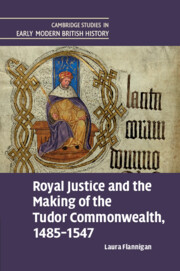Book contents
- Royal Justice and the Making of the Tudor Commonwealth, 1485–1547
- Cambridge Studies in Early Modern British History
- Royal Justice and the Making of the Tudor Commonwealth, 1485–1547
- Copyright page
- Dedication
- Contents
- Figures and Tables
- Acknowledgements
- Note on the Text
- Abbreviations
- Introduction
- Part I The New Justice System
- Chapter 1 The Principle and Problem of Justice
- Chapter 2 Conciliar Justice at Centre and Periphery
- Chapter 3 ‘Travailing between the Prince and Petitioners’
- Part II Seeking and Requesting Justice
- Part III Delivering and Contesting Justice
- Appendix Personnel in the Court of Requests, 1493–1547
- Bibliography
- Index
Chapter 1 - The Principle and Problem of Justice
from Part I - The New Justice System
Published online by Cambridge University Press: 02 November 2023
- Royal Justice and the Making of the Tudor Commonwealth, 1485–1547
- Cambridge Studies in Early Modern British History
- Royal Justice and the Making of the Tudor Commonwealth, 1485–1547
- Copyright page
- Dedication
- Contents
- Figures and Tables
- Acknowledgements
- Note on the Text
- Abbreviations
- Introduction
- Part I The New Justice System
- Chapter 1 The Principle and Problem of Justice
- Chapter 2 Conciliar Justice at Centre and Periphery
- Chapter 3 ‘Travailing between the Prince and Petitioners’
- Part II Seeking and Requesting Justice
- Part III Delivering and Contesting Justice
- Appendix Personnel in the Court of Requests, 1493–1547
- Bibliography
- Index
Summary
Chapter 1 establishes the intellectual and cultural backdrop for royal justice in late fifteenth and early sixteenth-century England. It explores what justice meant for the wider populace of this period, drawing from a range of elite and non-elite sources: coronation oaths and proclamations issued by the Crown; sermons and speeches made by the chief ministers of the realm in Parliament and Council; and bills of complaints, popular poetry, rebel petitions, and commonplace books produced by humbler people. Surveying this range of differing perspectives, the principle of justice supplied by the king proves to have been deeply ingrained across society. Yet how, exactly, it might be put into practice proved a more contentious topic, and one that opened even the existing royal courts up to criticism. This nebulous ideal, with its cognate concepts of mercy, pity, and charity, was already at odds with the law of the land by the middle of the fifteenth century. These fragmentations help to explain why a more extraordinary kind of royal justice was in demand, and to show the expectations that weighed upon it.
Keywords
- Type
- Chapter
- Information
- Publisher: Cambridge University PressPrint publication year: 2023

